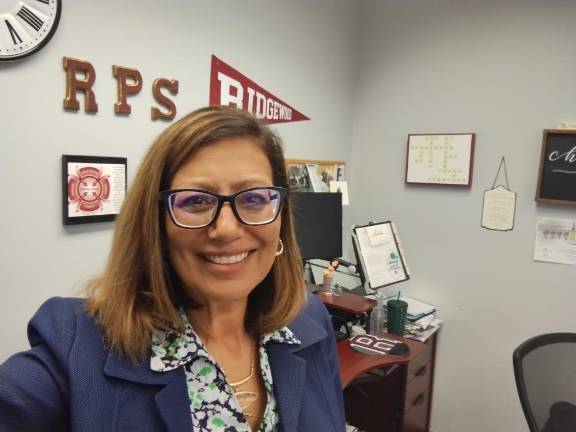Fenwick named N.J. Special Education Administrator of Year
WEST MILFORD. Michelle Fenwick has been director of special programs in the Ridgewood School District for four years.


Another end of a school year produces new graduates, grade-level advancements, memories, beginnings as well as well-deserved accolades.
One such recognition was bestowed on West Milford resident Michelle Fenwick, who was named New Jersey’s 2023 Special Education Administrator of the Year.
Fenwick, who is director of special programs in the Ridgewood School District in Bergen County, received the honor at the Spring Leadership Conference of the New Jersey Association of School Administrators (NJASA) and New Jersey Association of Pupil Services Administrators (NJAPSA) with Frontline Education on May 17 in Atlantic City.
The annual award recognizes a special-education administrator who has demonstrated outstanding leadership in providing services to students with disabilities and whose work reflects the highest ethical and professional standards.
At the NJASA/NJAPSA conference, many awards are presented but only one for Special Education Administration.
“It’s an incredible honor for many reasons, most notably on behalf of all the outstanding people I have the opportunity to work with,” Fenwick said.
“This award is a recognition for the inclusive special-education model of the Ridgewood School District, where we have strong and active leadership and support of community leaders, parents and teachers. I’m in good company with so many people working with me. It’s a great recognition for Ridgewood.”
Wife, mom, cancer survivor
A West Milford resident for more than 20 years, Fenwick and her husband, David, are the parents of two adult children, Lindsay and Lauren, who were educated in the West Milford School District.
She taught and was a speech therapist at Apshawa School for several years. She also served on the West Milford Board of Education and was its president in 2003.
Before moving into special-education administration, she had educational leadership roles at the New Jersey Department of Education and in the Pompton Lakes School District.
Fenwick is completing her fourth year as director in Ridgewood.
She is a frequent presenter, forum participant, and advocate on best practices for special education and speech therapy.
“When I worked in West Milford as a speech therapist, I made great connections with families who had youngsters who had difficulty in communicating,” she said. “Those were real moments where you saw progress and improvement with students one on one and (in) small groups. Fast forward to now, I don’t have many individual hands-on moments. Today I strive to have broader impact in establishing and building programs.”
Originally from Rockland Country, N.Y., Fenwick earned a bachelor’s degree in speech pathology and audiology and master’s degree from the State University of New York (SUNY) in Geneseo; a doctorate from Nova Southeastern; and a second master’s degree in educational leadership from William Paterson University in Wayne.
She also serves as an adjunct professor in education at William Paterson.
“My first job as a 14-year-old was volunteering at a residential school for disabled young people,” she said. “The experience was incredibly rewarding, foundational and helped shape my career path. I loved it, and as the years went on, I just kept going.
“I have a great passion for teaching and speech therapy, yet moving into special education administration fulfilled my desire to have a larger impact.”
Fenwick is also a cancer survivor, having overcome breast cancer seven years ago.
“While fighting and being treated for cancer, I met some beautiful women along the way, some of whom are sadly no longer with us,” she said. “The experience reminds me to stay present in the moment and to always keep moving forward.”
Part of the mainstream
“As a school administrator, my goal is to assist in leading a school district,” Fenwick said. “A major goal of mine is to make special education less of a stigma and more inclusive, which yields better results.
She noted that many other states have adopted the inclusion model in special education, some more proactively than New Jersey. Decades ago, before special education was a mandate in New Jersey schools, the state had specialized schools for the blind, disabled and other students with special needs.
“Research and learning show how much we can offer to children with special needs in being part of the mainstream. Special-needs students benefit greatly from an inclusive education where they can grow as individuals and peers, so when they leave the public school system, they can succeed in their ongoing education and careers as adults.
“Even in my college days, I had a strong interest in special education and inclusion, studying and writing on how educators, administrators and schools can better help and engage students with special needs.
“As an administrator in a highly supportive district like Ridgewood, I can build, develop and manage inclusion programs with a great team. It’s very fulfilling. For instance, in Ridgewood, we run collaborative professional learning groups that are focused on helping teams break through and gain confidence to take the next steps in achieving greater inclusive practices.”
Fenwick helped establish an initiative in Ridgewood called STEPSS for 18- to 21-year-olds who after high school graduation need more time and skill development to become more independent.
STEPPS team members recommend students based on their education data, transition goals and transition plan.
“STEPSS offers a welcoming culture where students are respected and regarded as full partners in the process of increasing independence,” she said. “The goal is to help them where we can, whether working on life skills, strengthening study skills in community college or working jobs.
“We help them gain more of the necessary skills for future employment and for independent daily adult life activities. It’s another example of Ridgewood’s outstanding commitment and support of inclusion for people with special needs, enabling them to move forward.”
Opportunities and obstacles
Fenwick acknowledges the progress that various school districts have made in special education and is proud of what’s been accomplished in Ridgewood.
The biggest challenge is recovering from the pandemic because virtually all students have more academic, emotional and therapeutic needs. Schools in New Jersey and elsewhere are dealing with more absenteeism and refusal, which is parents or students deciding not to attend classes.
She points out the greater need for caring, academic rigor and a safe place where all learners can feel encouraged to participate.
“For special-needs students, we need to keep their individual educational experience at center of the discussion,” Fenwick said.
Sometimes school boards have different priorities, resource limits and educational needs. Teachers need the resources, tools and support to help students succeed amid the growing social and emotional impacts.
It’s a difficult balancing act and every day can be a struggle for all involved, she said. “No one wants to see a child struggle. Everyone wants to unlock the potential of every child. Ultimately, we’re all working toward the same goal.
“I love what I do and am fortunate to have the opportunity to contribute to the Ridgewood School District.”
This award is a recognition for the inclusive special-education model of the Ridgewood School District, where we have strong and active leadership and support of community leaders, parents and teachers. I’m in good company with so many people working with me. It’s a great recognition for Ridgewood.” - Michelle Fenwick, New Jersey’s 2023 Special Education Administrator of the Year